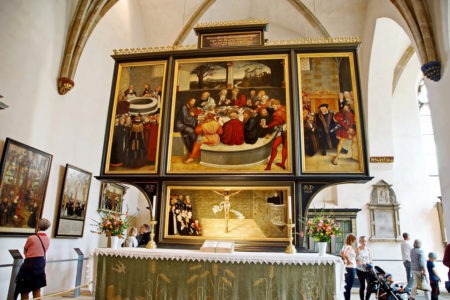For I am not ashamed of the gospel; it is the power of God for salvation to everyone who has faith, to the Jew first and also to the Greek. For in it the righteousness of God is revealed through faith for faith; as it is written, “The one who is righteous will live by faith.”
Romans 1:16-17 provides the thesis of Paul’s letter to the Roman church – a church that he had never visited, finally making it there before his execution. This scripture concerns the manner in which a person is made right with God: we are justified by grace, through faith.
This epistle has served as a catalyst for reform and renewal throughout church history, from Augustine and Luther to Wesley and Barth. It is the handbook of Christian theology, said Philip Melanchthon, Luther’s friend and comrade in the Reformation. Wesley’s heart was “strangely warmed” while someone read Luther’s preface to the Romans.
Recently, I toured Germany. This fall is the 500th anniversary of the Protestant Reformation. Martin Luther nailed his 95 theses on the cathedral door in Wittenberg on October 31, 1517. Luther had traveled to Rome in 1511 and was disappointed by the corruption he saw there. There was an old proverb in those days that said, “If there is a hell, it is likely under Rome.” What Luther saw was a church that was desperately in need of renewal. Watching the sale of indulgences, he saw an institution that had strayed from its center. Luther could not keep silent. His posting of the theses was the beginning of a long tide of reformation.
I returned home with 12 theses of my own, culled from lessons I learned from this experience. Whenever there’s a reformation:
- There’s a rediscovery of Scripture.
- There’s a recovery of grace.
- There’s a decentralizing of institutional hierarchy, and a localizing of ministry, a lay-centered movement.
- It brings change, and change brings pain.
- The division of church and state protects the faith. Whenever church and government synthesize, the faith loses.
- Most reformers are seen in their own generation as heretics.
- It’s important to use technology for our message.
- It’s important to listen and learn from other cultures.
- It’s important to contextualize the Gospel to our setting without losing the universality of faith.
- The team of people around Luther enabled the reformation to succeed.
- Luther was anti-Semitic later in life. Reformers don’t get everything right.
- It’s important to value ecumenism and interreligious dialogue.
So consider – what does mission and evangelism look like in a global, high-tech, multi-cultural world?
